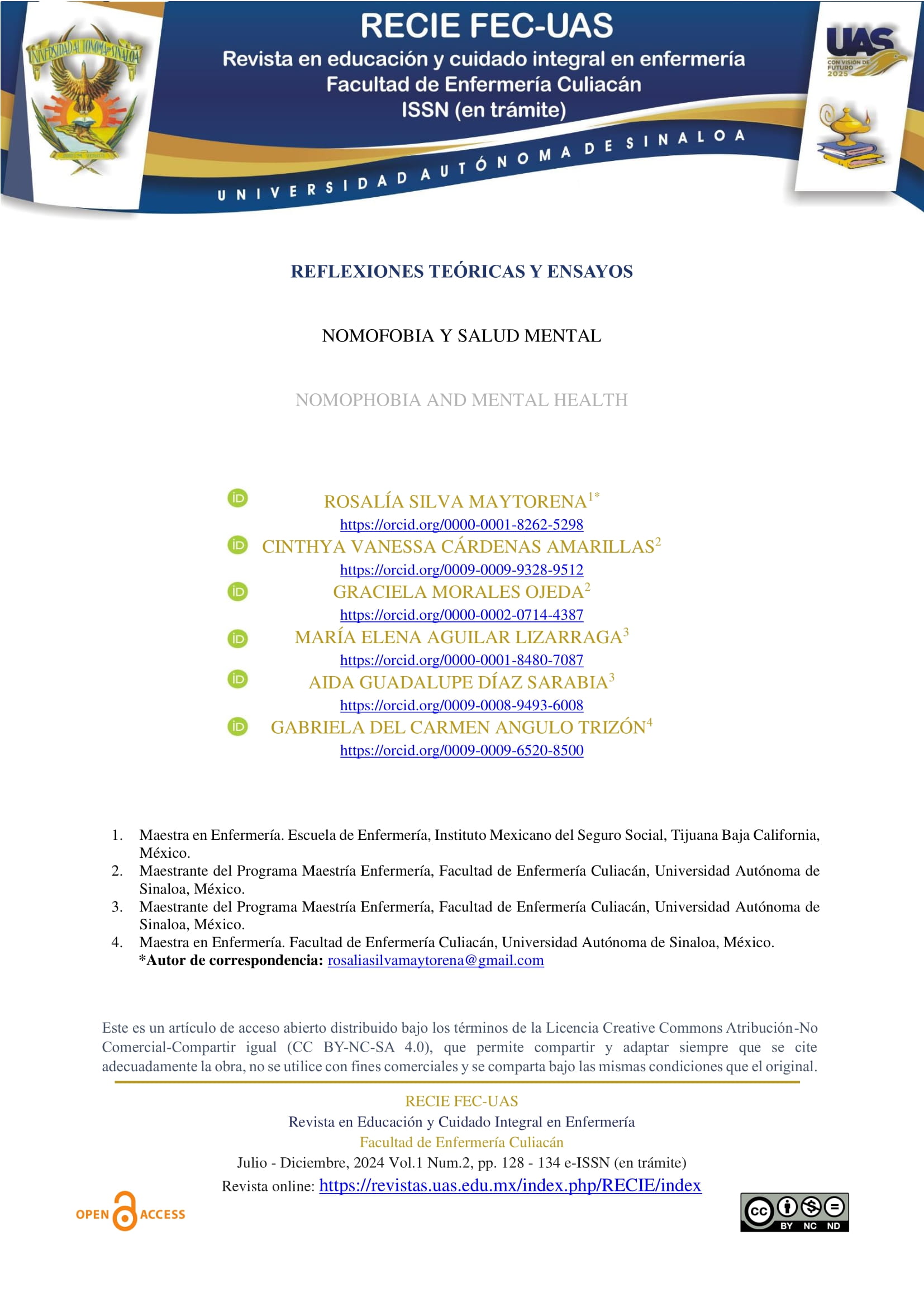Nomophobia and Mental Health
Keywords:
Nomophobia, Mental health, Mobile devices, Emotional well-being, InterventionsAbstract
Introduction: Nomophobia, the irrational fear of being without a mobile phone, has emerged as a relevant phenomenon in today’s context, especially among young people. This disorder is associated with excessive device use and has significant implications for mental health. Objective: Explore the relationship between nomophobia and mental health, analyzing its symptoms, consequences, and the need for intervention. Development: Recent studies documenting the effects of nomophobia on emotional and psychological well-being were reviewed. Research reveals that associated symptoms include anxiety, depression, sleep disturbances, and deterioration of interpersonal relationships. Furthermore, compulsive device use can increase feelings of loneliness and emotional disconnection, which in turn exacerbates mental health issues. Conclusion: It is crucial for health professionals and educators to recognize nomophobia as a serious problem that requires attention. Developing prevention and intervention programs is recommended to mitigate its effects and promote healthy technology use.
Downloads
References
Braña Sánchez, A. J. (2023). Nomofobia y FoMO en el uso del smartphone en jóvenes: el rol de la ansiedad por estar conectado. Salud y drogas, 23(1). https://doi.org/10.21134/haaj.v23i1.707
Castro Quintero, D., Tirado Reyes, R. J., Gómez Tejeda, M. A., Martínez Montoya, B. G., Navarro Rodríguez, D. C., Garay Núñez, J. R., Jiménez Barraza, V. G., Gaxiola Flores, M., & Mascareño Castro, S. Y. (2024). Screening for Anxiety, Depression and Panic in older adults in a Family Medicine Unit in Sinaloa, Mexico. Salud, Ciencia Y Tecnología, 4(1), .961. https://doi.org/10.56294/saludcyt2024.961
Cerro Herrero, D., Rojo Ramos, J., González González, M. de L. Á., Madruga Vicente, M., & Prieto Prieto, J. (2020). Dependencia y adicción al smartphone de una muestra de jóvenes extremeños: diferencias por sexo y edad. Tecnología, ciencia y educación, 35–53. https://doi.org/10.51302/tce.2020.483
Gokani, N. S., Deshmukh, D. D., Godara, P., Marwale, A. V., Bhise, M. C., Jadhav, S. S., & Murambikar, G. P. (2021). Irrational fear of being away from smartphone among health-care workers: An observational study. Indian Journal of Social Psychiatry, 37(3), 295–300. https://doi.org/10.4103/ijsp.ijsp_125_20
Ibarra Fragoso, S., Tirado Reyes, R. J., Domínguez Quevedo, B. M., Castañeda Ayón, K. C., Navarro Rodríguez, D. C., Medina Serrano, J. M., Valladares Trujillo, R., Aguilar Lizarraga, M. E., & Angulo Inzunza, C. A. (2024). Nomophobia in Nursing Staff and Interns at a Second Level Medical Care Hospital in Mexico. Salud, Ciencia Y Tecnología, 4(1), .964. https://doi.org/10.56294/saludcyt2024.964
Iberdrola. (2023). Nomofobia: El Peligro Emocional de la Adicción Al Celular. https://somosimpactopositivo.com/impactando-en-positivo/nomofobia-adiccion-al-celular/
King, A. L. S., Valença, A. M., Silva, A. C. O., Baczynski, T., Carvalho, M. R., & Nardi, A. E. (2013). Nomophobia: Dependency on virtual environments or social phobia? Computers in Human Behavior, 29(1), 140–144. https://doi.org/10.1016/j.chb.2012.07.025
Lupo, N., Zacchino. S., Caldararo, C., Calabrò, A., Carriero, C., Santoro, P., et al. (2020). El uso de dispositivos electrónicos y los niveles relativos de nomofobia en un grupo de enfermeras italianas: un estudio observacional. https://riviste.unimi.it/index.php/ebph/article/view/17082/15049
Organización Mundial de la Salud [OMS]. (2022). Salud mental: fortalecer nuestra respuesta. Who.int. https://www.who.int/es/news-room/fact-sheets/detail/mental-health-strengthening-our-response
Salcedo Cadena, R. M., & Lara Salazar, M. (2022). Nomofobia y su relación con las habilidades sociales en adolescentes. Ciencia Latina Revista Científica Multidisciplinar, 6(6), 10554-10565. https://doi.org/10.37811/cl_rcm.v6i6.4148
Tao, Y., Tang, Q., Zou, X., Wang, S., Ma, Z., Zhang, L., & Liu, X. (2023). Effects of attention to negative information on the bidirectional relationship between fear of missing out (FoMO), depression and smartphone addiction among secondary school students: Evidence from a two-wave moderation network analysis. Computers in Human Behavior, 148(107920), 107920. https://doi.org/10.1016/j.chb.2023.107920
Tirado Reyes, R. J. (2023). Adicción a los teléfonos móviles y uso de aplicaciones relacionadas a la salud. Paraninfo Digital, (35), e35049d. Recuperado a partir de https://ciberindex.com/c/pd/e35049d
Valdez Bernal, E. D., Tirado Reyes, R. J., Garay Núñez, J. R., Dorantes Bernal, K. E., Jiménez Barraza, V. G., Medina Serrano, J. M., Gil Ramírez, A. L., & Beltrán Montenegro, M. del C. (2024). Screening for mental disorders in health workers. Salud, Ciencia Y Tecnología, 4(1), .909. https://doi.org/10.56294/saludcyt2024.909

Downloads
Published
Issue
Section
License

This work is licensed under a Creative Commons Attribution-NoDerivatives 4.0 International License.

